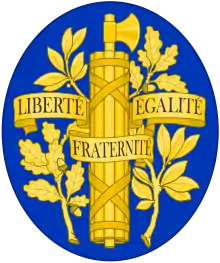Presidential elections in France
Presidential elections in France determine who will serve as the President of France for the next several years.
| This article is part of a series on the |
| Politics of France |
|---|
 |
Currently they are held once in five years (formerly seven).[1] They are always held on Sundays.[2] Since 1965 the president has been elected by direct popular vote.[3][4][5]
History
Second Republic
There was one presidential election in France during the government known as the Second Republic (1848—1851). It was held in 1848. The president was elected by direct popular vote.
Third Republic
There were 15 presidential elections in France during the government known as the Third Republic (1870—1940).
According to the Constitutional Laws of 1875, the President was elected by an absolute majority of votes by the two houses of the Parliament assembled at the National Assembly.
Fourth Republic
There were two presidential elections in France during the republican government known as the Fourth Republic (1946—1958). They were held in 1947 and 1953.
The president was elected by the Congress of the French Parliament, a joint meeting of both houses of the French Parliament[6] (the National Assembly and the Senate).
Fifth Republic
There have been 11 presidential elections in France since the establishment of the Fifth Republic in 1958.
Originally the president was elected by the Collège des Notables (an assembly of "notable electors") that included around 80,000 county and city/town councillors (who had been elected locally).[6]
Following constitutional reform in November 1962 (the constitutional Act of 6 November), pushed by President de Gaulle, the president has been directly elected by the people of France in a two-round election.[7]
Until a 24 September 2000 constitutional referendum, the president had been elected for a seven-year term since 1974. With the referendum being successful, the term was reduced to five years. Therefore once the winner of the 2002 election, Jacques Chirac, took office as president, the next election was scheduled for 2007 rather than 2009.[7]
Currently, the President of the French Republic is elected to a five-year term in a two-round election under Article 7 of the Constitution: if no candidate secures an absolute majority (including blank and void ballots) of votes in the first round, a second round is held two weeks later between the two candidates who received the most votes.[8] Since 1965, when the current (direct) election system was introduced, every election has gone to a second round.[4]
The latest election was in 2017. The first round was held on 23 April 2017, the second on 7 May.[9]
See also
References
- Dennis C. Mueller (17 February 2003). Public Choice III. Cambridge University Press. pp. 433–. ISBN 978-0-521-89475-3.
- "When is the French Presidential Election 2017, how does it work and who are the candidates?". The Telegraph. 2017-04-22. Retrieved 2017-04-22.
- "France at the Polls: The Presidential Election of 1974". AEI. 2017-07-29. Retrieved 2017-04-23.
- William G. Mayer (2004). The Making of the Presidential Candidates 2004. Rowman & Littlefield. pp. 266–. ISBN 978-0-7425-2919-9.
direct vote France since 1965.
- Robert Wistrich (2 September 2003). Terms of Survival: The Jewish World Since 1945. Routledge. pp. 226–. ISBN 978-1-134-85579-7.
- Philip Thody (1989). French Caesarism from Napoleon I to Charles de Gaulle. Palgrave Macmillan UK. pp. 105–. ISBN 978-1-349-20089-4.
- Susana Galera (1 January 2010). Judicial Review: A Comparative Analysis Inside the European Legal System. Council of Europe. pp. 71–. ISBN 978-92-871-6723-1.
- "Constitution du 4 octobre 1958 - Article 7". Légifrance. Retrieved 22 February 2017.
- "John Oliver Explains Why the French Presidential Election Is More Important Than You Think". Newsweek. 2017-04-17. Retrieved 2017-04-22.